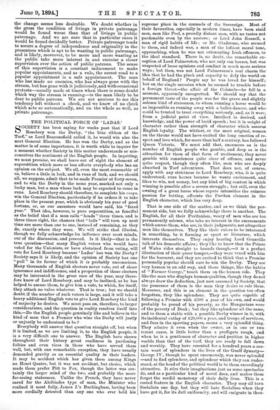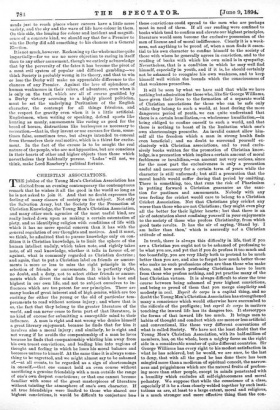THE POLITICAL FORCE OF LADAS.'
SOCIETY has been saying for weeks past that if Lord Rosebery won the Derby, "the blue ribbon of the Tart" as Lord Beaconsfield called it, he would win also the next General Election. He has won the Derby, and as the matter is of some importance, it is worth while to inquire for a moment whether Society in this matter understands or mis- conceives the sentiment of the English people. In inquiring, we must premise, we shall leave out of sight the element of superstition which more or less affects everybody who has an opinion on the subject. We all, even the most reasonable of us, believe a little in luck, and in runs of luck, and we should all, we suppose, admit that to be made Premier at forty-seven, and to win the Derby in the same year, marked not only a lucky man, but a man whose luck may be expected to come in runs. Lord Rosebery should therefore, to complete his coups, win the General Election, particularly if he orders it to take place in the present year, which is obviously his year of good fortune, or, as our ancestors would have said, his "fated year." That idea, however, is pure superstition, as fanciful as the belief that if a man calls " heads " three times, and is three times right, the chances that " tails " will turn up next time are more than one to one, instead of remaining, as they do, exactly where they were. We will strike that illusion, though we fully acknowledge its influence over most minds, out of the discussion, and proceed. Is it likely—that is the true question—that many English voters who would have voted for the Unionists, or have abstained from voting, will vote for Lord Rosebery because Lades ' has won the Derby P Society says it is likely, and the opinion of Society has one " pull " in its favour of which it is probably unconscious. Many thousands of English electors never vote, out of sheer ignorance and indifference, and a proportion of those electors may be interested in the great race of the year, may there- fore know of Lord Rosebery, and may be inclined, as he has helped to amuse them, to give him a vote, to which, for itself, they attach no value whatever. That is true; but we should doubt if the number of such voters is large, and it will take a heavy additional English vote to give Lord Rosebery the kind of majority he desires. We must pass on, therefore, to larger considerations, and the question in reality resolves itself into this,—Do the English people genuinely like and believe in the kind of man that a Premier who wins the Derby will justly or unjustly be understood to be ?
Everybody will answer that question straight off, but when it is limited, as we are limiting it, to the English people, it is a very difficult one to answer. The English have shown throughout their history great readiness in pardoning foibles and even vices in those who have served them well, but, with one remarkable exception, they have usually demanded gravity as an essential quality in their leaders. It may be accident which has given them among Kings no Henri Quatre, but it was not accident, but choice, which made them prefer Pitt to Fox, though the latter was cer- tainly the larger mind of the two, and probably the more far-seeing statesman. Unlike the French, they have never cared for the Alcibiades type of man, the Minister who realised it most fully, James I.'s Buckingham, having been more cordially detested than any one who ever held his supreme place in the counsels of the Sovereign. Most of their favourites, especially in modern times, have been staid men, men like Peel, a proudly distant man, with no tastes not pardonable even by the austere ; or Lord John Russell, a man of rigid habits of life ; or Mr. Gladstone, who seemed to them, and indeed was, a man of the loftiest moral tone, approaching, when he was not extenuating Irish offences, to the ideal standard. There is, no doubt, the remarkable ex- ception of Lord Palmerston, who not only ran horses, but was suspected of loose opinions and conduct in much more serious ways ; but then, was not Lord Palmerston's real charm the idea that he had the pluck and capacity to defy the world on behalf of England ? People say he was loved for himself; but on the single occasion when he seemed to truckle before a foreign threat—the affair of the Colonels—he fell in a moment, apparently unregretted. We should say that the permanent taste of the people was for the grave and slightly solemn kind of statesman, to whom running a horse would be as impossible as running away with a ballet-dancer, and who could be trusted to treat everything seriously, and, as it were, from a judicial point of view. Intellect is desired, and knowledge, and the power of lucid speech ; but it is weight of character rather than strength of character which assures English loyalty. The wittiest, or the most original, woman on the throne would not have excited the long emotion of re- spect and love which, for more than half a century, has followed Queen Victoria. We must add that, enormous as is the number of English people who gamble, and deep as is the attraction for them of that form of excitement, they never gamble with consciences quite clear of offence, and never quite respect, though they often like, men who are deeply absorbed in Turf adventures. That does not, of course, apply with any strictness to Lord Rosebery, who, it is quite understood, runs horses because he wants excitement, and likes to win, not money, but any kind of big contest in which winning is possible after a severe struggle ; but still, even the owning of a great horse whose repute intensifies the ruinous passion for betting, affronts the Puritan element in the English character, which lies very deep.
That is one side of the matter, and as we think the per- manent side, but we fully acknowledge there is another. The English, for all their Puritanism, weary of men who are too permanently solemn, who take no interest in the amusements which amuse them, who are, in their judgments, not altogether men like themselves. They like their rulers to be interested in something, be it farming or sport or literature, which interests themselves. They enjoy hearing Lord Granville talk of his domestic affairs ; they like to know that the Prince of Wales rides straight to hounds though,—it is a perfect illustration of their queer temper,—they were vexed with him for the baccarat, and they are excited to think that a Premier personally popular should care to win the Derby. They are very human in an odd way, and these things, like the habits of "Farmer George," touch them on the human side. They like the man who displays human qualities, though they do not always draw the deduction, just now assumed by Society, that the possessor of them is the man they desire to rule them. Moreover, and this is an element in the question too often forgotten, they like splendour. They are quite capable of following a Premier with 2500 a year of his own, and would probably be proud of his poverty, as the Hungarians were of the poverty of Deak ; but they like splendour all the same, and to them a stable with a possible Derby winner in it, with its incidental outlay of £20,000 a year, and troops of servitors, and fuss in the sporting papers, seems a very splendid thing. They admire it even when the owner, as in one or two recent cases, is little better than a profligate rough, and when be is a gentleman of character and position in higher worlds than that of the turf, they are ready to fall down and worship. They have resented for a hundred years a cer- tain want of splendour in the lives of the Guelf dynasty— George IV., though be spent enormously, was never splendid —and to find splendour, and splendour which they can under- stand, at the head of the political world is to them exceedingly attractive. It stirs their imaginations just as some spectacles do, and as a particular kind of novel does, and makes them forget the sordid monotony of their daily lives. This is a rooted feature in the English character. They may all turn Socialists one day, but they will hate Socialism when they have got it, for its dull uniformity, and will emigrate in thou- sands just to reach places where careers have a little more variety, and the sky and the wave of life have colour in them. On this side, the longing for colour and incident and magnifi- cence of a concrete kind, we should say that for a Premier to win the Derby did add something to his chances at a General Election.
It is not much, however. Reckoning up the whole matterquite impartially—for we see no more objection to racing in itself than to any other amusement, though we entirely acknowledge that by the perversity of the fates it has become the pivot of a most evil system of popular and diffused gambling—we think Society is probably wrong in its theory, and that to win or lose the Derby will make no appreciable difference to the chances of any Premier. Against the love of splendour, of human weaknesses in their rulers, of adventure, even when it is only on the turf, which are all of course gratified by a Derby victory accruing to a highly placed politician, must be set the underlying Puritanism of the English character, the contempt for all things frivolous, and the respect for gravity even when it is a little artificial. Englishmen, when writing or speaking, defend sports like hunting as manly, amusements like racing as good for the breed of horses, distractions like burlesques as necessary to recreation,—that is, they invent or use excuses for them, some- times false, sometimes true, but always intended to conceal from themselves their real motive, which is a thirst for excite- ment. In the fact of the excuse is to be sought the real nature of the people, who are not hypocrites, but are conscious in their hearts of other and higher objects than those which nevertheless they habitually pursue. Ladas ' will not, we think, make Lord Rosebery's political fortune.







































 Previous page
Previous page